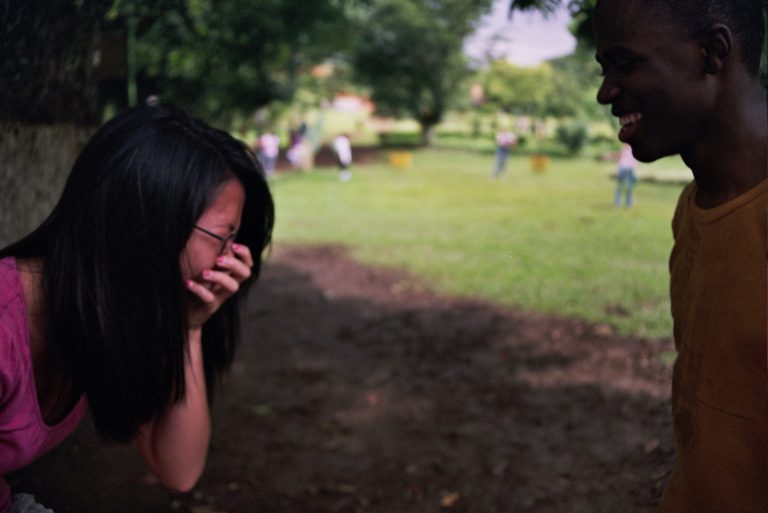
Image by Scott Olson/Getty Images, © All Rights Reserved.
Our November Surprise: I Predicted the Winner
By the time this column appears on November 9, we’ll most likely know the results of the 2016 presidential election. But I need to send this piece to On Being no later than November 7, a day before the votes are cast and counted.
You don’t need to worry about the fact that I’m writing a post-election column with no clue as to what happened yesterday. You see, I predicted our November surprise months ago — and for almost a week, I’ve known that I nailed it. I didn’t publish my prediction earlier for fear it would jinx things. Instead, I put it in my journal and had the page notarized in case anyone challenged my claim. Here’s what I wrote:
In the fall of 2016, the Chicago Cubs will win the World Series for the first time since 1908. Without doubt, that will be our November surprise!
I suppose it’s possible that some of you are more interested in the election than in baseball — I’ll get to it in a moment, I promise. But before I get there, I need to share a brief backstory about the Cubbies and me.
I was born in Chicago and lived in the Chicago area until I graduated from college. So I’ve been a Cubs fan ever since the era of Ernie Banks, Hank Sauer, and Phil Cavarretta. Those guys were great players, but one way or another, the team always managed to blow the season. As a result, I learned about heartbreak at an early age, a lesson that’s helped me — and millions of fellow Chicagoans — survive adulthood more or less intact.
For over thirty years, Jack Brickhouse was the Cubs’ play-by-play sportscaster on WGN-TV. Shortly before he died in 1998, an interviewer asked him why the Cubs had not won a World Series for almost one hundred years. “Hell,” he said, “anyone can have a bad century!”
At age 77, I take solace in Brickhouse’s words. For more than three fourths of a century, I’ve fallen down, gotten up, lost my spiritual balance and fallen down again — a pattern I’ve repeated frequently amid the madness of the past year of electioneering. Given our disheartening times, to say nothing of human frailty, I’m sure I’m not the only one who can use the perspective that comes from knowing that “anyone can have a bad century.”
Like every other American century, the one we’re in has gotten off to a rocky start: wars, terrorism, economic crisis, growing fear of “otherness,” domestic gun violence, global warming, and partisan political obstructionism. This election has made it clear that our troubles won’t go away soon. No matter who our new president is, many who voted for the losing candidate have said, in effect, that they’ll respond to “the enemy occupation” as a national emergency.
In a recent New York Times/CBS News poll, 11 percent of Democrats and 27 percent of Republicans said that if their candidate doesn’t win, they will “probably not accept the results.” That’s 7,920,000 Democrats and 14,850,000 Republicans, based on the numbers of registered voters. Some of Clinton’s supporters have said they’ll “join the resistance” or “move to a civilized country like Canada” if Trump wins. Some of Trump’s supporters have said they’ll start an armed insurrection if Clinton wins.
For the foreseeable future, the United States will continue to be a gravely wounded body politic, not merely divided but fractured around basic questions of who we are as a people.
This campaign — which has set new records in fact-free political discourse and hate-filled rhetoric — has generated a toxic “fog of war.” How could it be otherwise, given the racism, religious bigotry, sexism, misogyny, xenophobia, free-floating inhumanity and threats of violence that have polluted the air we breathe during this endless election “season”?
Many Americans have expressed shock at the national heart of darkness revealed by the 2016 campaign. But the shocked are largely people like me whose lives have not been directly threatened by sexism, racism, religious bigotry, and kindred evils. For the millions of African-, Hispanic-, and Muslim-Americans and women, who’ve long been subject to the insults and injuries that accompany the “-isms,” none of this has come as any surprise.
It’s not all bad news that many folks like me feel we’ve become strangers in a strange land, one with a heart of darkness we hadn’t seen up-close and personally until now. The good news — I hope — is that more of us can now empathize with our fellow citizens who’ve been wounded by a culture of cruelty. If people like me can admit our own new-found alienation, we might find the courage to join in the struggle for justice with those who have long been denied it.
People like me also need to empathize with folks who’ve been devastated by the loss of jobs, homes, and entire communities. Despite my personal history of actively caring about those on the margins — which led me to become a community organizer early in my adult life — I’ve been short on compassion for that subset of Trump supporters during this campaign. I’ve bypassed their rightful complaints in my rush to criticize their embrace of bogus solutions proposed by people who care only about their votes, not about their fates.
It makes no sense to blame job loss on “those people” — people of color — who are “taking our jobs away.” It makes even less sense to believe that by walling or throwing “those people” out, jobs will be restored. Those jobs are being given away by greedy corporations to whoever must work for subpar wages if they are to survive, just barely. So I and others like me must find the compassion and courage to join the dispossessed in a struggle for economic justice that’s aimed at the true sources of the problem.
If you’re still with me, you may be asking the vexing question, “What can I do?” For me, the answer begins within, then moves out into the world. I must own up to my fears, confess my ignorance and arrogance, seek forgiveness from those I’ve wronged, practice humility, and learn to listen beneath my own and other people’s political rhetoric for what Howard Thurman called “the sound of the genuine” in each of us. Beneath the shouting, there’s suffering. Beneath the anger, fear. Beneath the threats, broken hearts. Start there and we might get somewhere.
Does that sound like too much to ask of ourselves and each other? Perhaps. But if we can take at least a few steps in that direction, here’s something I know to be true as surely as I knew the Cubs would win: When I draw my last breath, I’ll be glad I tried to summon the better angels of my nature. Maybe you will, too.
As we move from inner work to work in the world, there are myriad answers to “What can I do?” — depending on who we are, where we are, how we are, and what’s within our reach. Perhaps it’s raising a child to be a caring citizen. Or speaking up when the most vulnerable among us are maligned. Or sharing our resources. Or getting more involved politically.
Here’s where many of us get stuck, thinking of how little power we possess compared to the enormity of our nation’s problems. So let’s listen to the wisdom of writer and activist Wendell Berry who reminds us that, when it comes to big problems, there’s never been one big answer, only a million-million little ones.
If you believe that the little thing you’re doing can’t possibly make a big-picture difference, remember Berry’s words:
“We don’t have a right to ask whether we’re going to succeed or not. The only question we have a right to ask is what’s the right thing to do?”
When the Chicago Cubs won the World Series — did I mention that I predicted it? — many people gave much of the credit to Theo Epstein, whom the Cubs hired in 2011 as president of baseball operations. But in a locker room interview with MSNBC’s Jonathan Alter right after Game 7, Epstein said:
“It’s not about me… A great organization is a thousand little sacrifices when no one’s looking — a scout traveling 100 miles out of his way to see a prospect, the stat people up all night — it takes everyone… All that business school leadership stuff is [BS]… [If there’s a secret, it’s to] keep deflecting credit, keep from blaming. Live your … life and be nice to people.”
If we want America’s “bad century” to get better sooner rather than later, Epstein’s advice will serve us as well as it served the Cubs. It’s not all about who’s president. It’s also about “We the People” and whether we can come together to hold ourselves and our leaders accountable to the common good.
A sense of humor can help, as Jack Brickhouse knew. In a Hindu epic called The Ramayana, there’s a maxim President Kennedy turned to during hard times — one that often comes back to me as I make my way through the opening years of this challenging century:
“There are three things that are real: God, human folly and laughter. The first two are beyond our comprehension, so we must do what we can with the third.”

